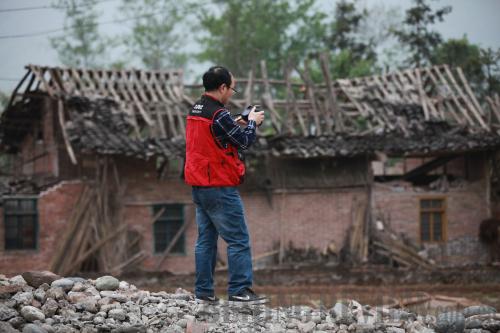|
 |
|
ASSESSING DAMAGE: On April 21, a seismological worker evaluates damage caused by an earthquake on the previous day in Xinglong Village in Lushan County, Sichuan Province, to determine its intensity (JIN LIWANG) |
After a 7.0-magnitude earthquake jolted Lushan County in Ya'an City in southwest China's Sichuan Province on April 20, a man in distant Heze City, Shandong Province, rose to instant Internet fame. He was dubbed "the king of prophets" after netizens discovered that he successfully predicted the earthquake in Lushan one month before it hit.
The name of the man's microblog account means "ancestor of earthquake deciphering." He wrote on March 26, "On the evening of March 19, a tornado hit Daoxian County, Yongzhou City in Hunan Province. Look! About 30 days later, an earthquake measuring at least 7.0-magnitude will strike to the northwest of the spot where the tornado disappeared."
It turned out that a 7.0-magtitude did occur about 30 days later, in Lushan County, which lies to the northwest of Daoxian County.
In the last five years, China has been hit by several damaging earthquakes including the devastating 8.0-magnitude Wenchuan earthquake that resulted in 69,227 confirmed deaths in May 2008.
As people survey damage in the aftermath of earthquakes, many cannot help wondering whether they can be predicted. Some looked retrospectively for phenomena that could have offered a warning, hoping to gain the ability to predict future quakes.
Unreliable prediction
Unfortunately, earthquake predictions are often found to be without merit. On April 24, official media People's Daily listed 10 big rumors about the earthquake in Lushan, among them, the anonymous Heze resident's prediction.
Netizens disclosed that the so-called "king of prophets" has predicted more than 1,500 earthquakes, but only five occurred.
Usually, non-governmental earthquake predictors make frequent prognostications, most of which are wrong, whereas "only the one that is correct is ever talked about," said Chen Huizhong, a research fellow with the Institute of Earthquake Science under the China Earthquake Administration (CEA).
"So far, no one has made an accurate imminent earthquake prediction. This is a difficult scientific issue confronting humankind," Chen said. "Non-governmental predictors usually give a time range of days or months and talk about a large geographical areas. Given that seismic disturbances of various magnitudes happen quite frequently, they are likely to make correct predictions by luck."
Now, scientists try to detect earthquakes by monitoring seismic noises and ultra-low magnetic waves, which require large amounts of equipment and data processing.
In recent years, experts in the field mostly predicted earthquakes by way of experience and consultation. In this way, the likelihood of a correct prediction is 30 percent at best, and zero at worst, according to Chen.
As for predictions by NGOs or individuals, Chen said that if predictors are confident in their forecasts, they can report to the CEA. The administration will hold consultations and report to higher levels of the government, which will decide whether to announce the prediction.
Sun Shihong, a research fellow with the China Earthquake Networks Center told China Youth Daily that relevant government organizations can refer to or even adopt some of the methods used by non-governmental predictors.
"The non-governmental sector should be encouraged to explore these areas," Sun said.
Controversial prediction
The mostly widely reported official prediction of an imminent earthquake was made prior to the 7.3-magnitude earthquake that hit Haicheng City in northeast China's Liaoning Province on February 4, 1975. Yet until today, whether the prediction was successful is still questionable.
In 1972, three years before the Haicheng earthquake, Geng Guoqing, then a seismological researcher in Beijing, predicted that there would be devastating earthquakes in three areas in north China, namely, south Liaoning Province, Luanxian County in Tangshan City in Hebei Province, and the vicinity of Hebei's Shijiazhuang City, Xingtai City and Yixian County.
| 